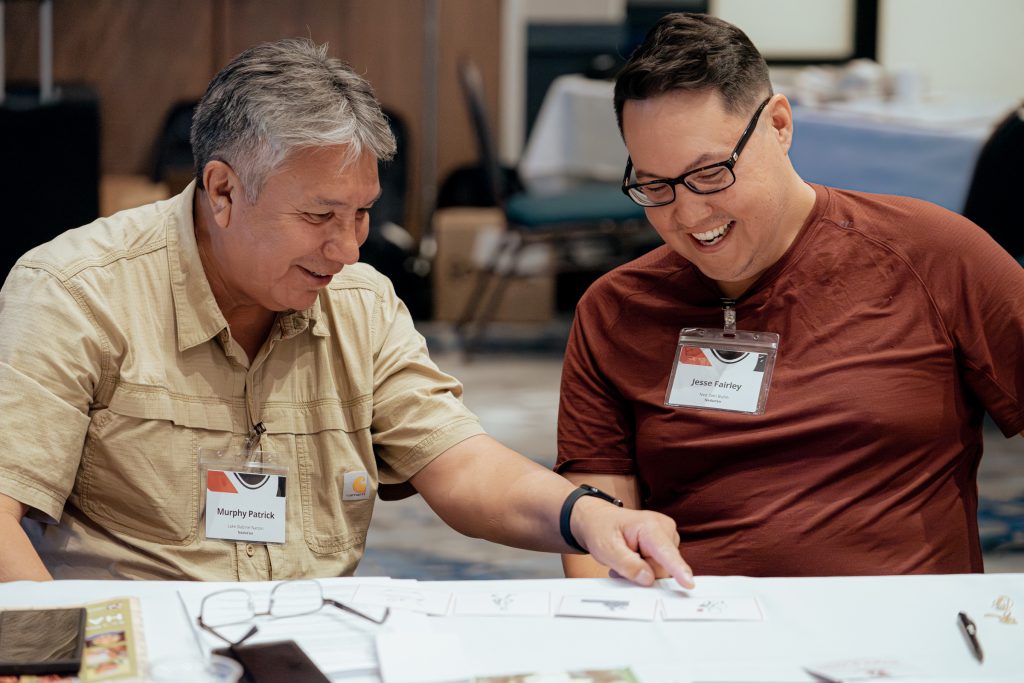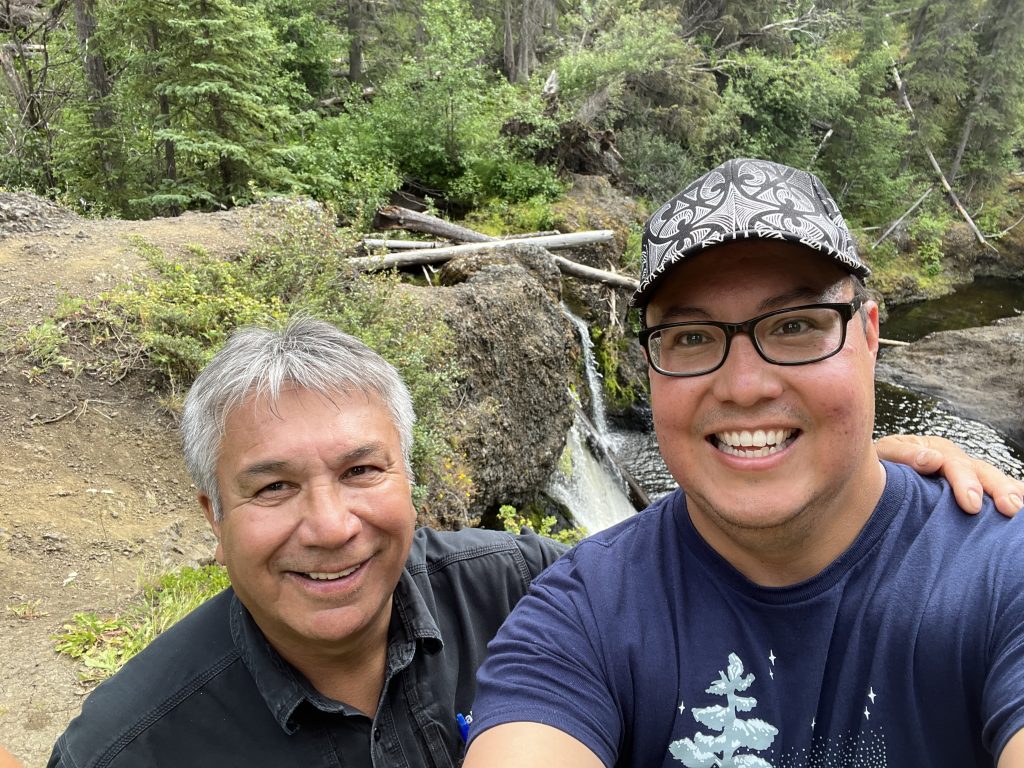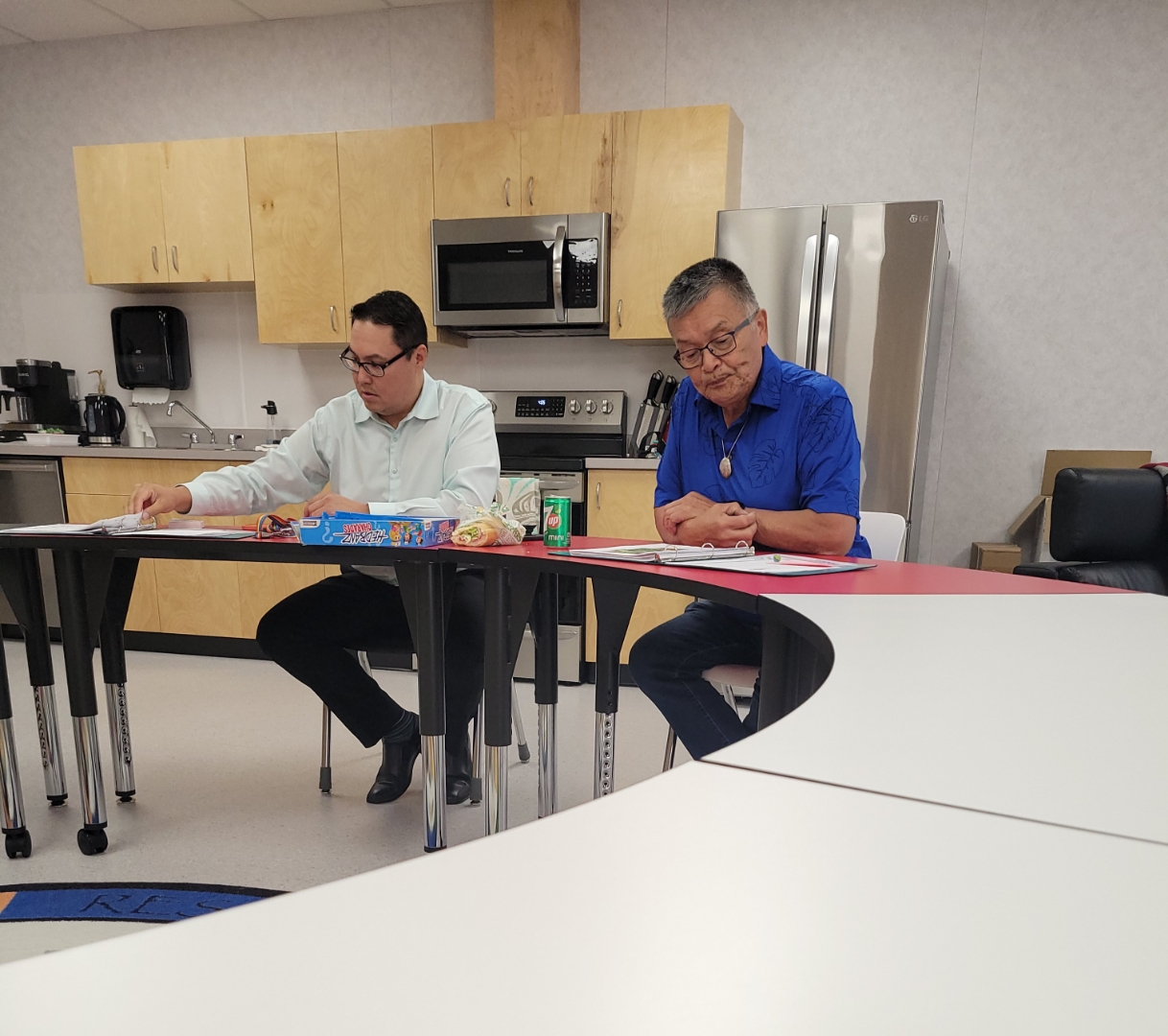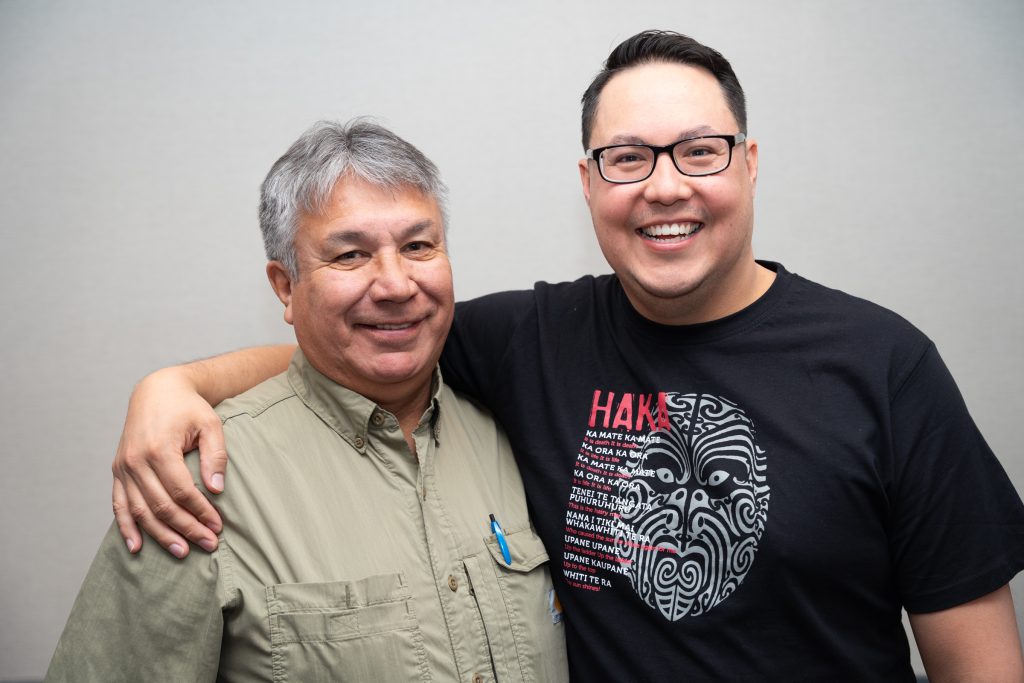Jesse Fairley talks about his experiences learning his ancestral language through FPCC’s Mentor-Apprentice Program
Jesse Fairley is a member of the Beaver Clan of the Nee Tahi Buhn First Nation currently in his second year of the three-year Mentor-Apprentice Program. Jesse has already completed over 300 hours of immersive learning with his mentors Murphy Patrick and Gordie Alec in the Nedut’en (Carrier) language.

Jesse’s inspiration for applying to the Mentor-Apprentice Program was his desire to better understand the worldview of his Elders and Ancestors to share it with his own family.
“I really wanted to conquer my western brain and understand what I didn’t know,” Jesse says. “Indigenous people, we live in two worlds. The English western world has been very dominant for many of us for all of our lives and is in everything we watch on TV, what we learn in school, what we do in our professional lives. Many of my generation grew up without our language, which means we couldn’t communicate fully with our great knowledge holders, Elders and grandparents. That’s a loss of being able to access what they know, being able to access our knowledge, our histories, our ways.”
Jesse was very close with his late grandfather, Thomas Morris. The two spent a lot of time together talking, but the conversations were always in English.
“I used to sit and talk with him for hours, and sometimes he would tell me stories of our people, but because he had to change them into English, I knew I was missing out on something. So that has been a really powerful motivator for me – wanting to walk in, and live in, that world more. There are many things we do now without our language that help us to live in that way – things like participating in Potlatch or harvesting, sitting on the land or visiting with family – but they become that much more powerful when we do them in our own language.”
Jesse’s aim is to be able to confidently understand and converse in the Carrier language. His long-term goal is to share the language with his children and future grandchildren so that it becomes the primary language used at home and family gatherings.
‘Udigilh’ekh – I am learning
Jesse currently works with not one, but two, mentors to learn Nedut’en. Participants in the program have the option to apply with up to three mentors, but the learning still takes place one-on-one, in individual (not group) settings. Having more than one mentor, Jesse says, definitely has its benefits.
“It’s, of course, really helped with scheduling and with time,” he says. “It has also helped to have that variability in approach. One of my mentors is incredible at sounds and hearing what I’m saying and getting me to say it correctly. I have the other mentor who’s incredibly strong at understanding the program, understanding teaching and learning and how to prompt me in the right way.”

His two mentors have helped him navigate the challenges of learning a language that is very different to English.
“The learning experience so far has been wonderful, and it’s been powerful. A lot of joy, a lot of learning, a lot of growth and a lot of struggles,” he says. “It’s a struggle to decolonize your mind in the early stages, but you do get through it. It was surprising to me how much my brain tried to anglicize our language. That was the hard part for me, was all those small sounds and my poor brain was trying to turn them back to English. You just have to give it time and practice.”
Jesse offers this example of just one of the many differences between English and Carrier:
“It’s a new way of looking at the world, and one of the examples I have is prepositions such as in, on, under, above. In English, I can say something’s in the box, like the pen is in the box, the cat is in the box. In Carrier, it’s different if it’s a living thing in the box or an inanimate object in the box. It’s different if the living thing is standing or sitting or what it’s doing in the box. Even the object: what kind of object is it? How is it shaped? Is it round? There’s just so many interesting complexities that we never have to deal with in English, which can be challenging to learn.”

Lhilh’idit’ah – we are working together
Jesse admits he is lucky to have language mentors from his community that he already had strong relationships with. Murphy Patrick Sr. is a longtime friend, and his other mentor, Gordie Alec, is Jesse’s father-in-law.
“I was already close with my mentors before, and now we’re close in a new way. We share something that’s really special. I think we all take a lot of pride in the work that we do together. We’ve become better at the program, at the process, at reminding ourselves to stay in Carrier, to repeat things in Carrier, and for myself, to be brave and try and speak as much as I can,” he says.
Being brave and willing to make mistakes has been something Jesse has taken on not just in private sessions, but also out in public at community gatherings. His weekly language lessons with Murphy and Gordie have taken place in a variety of locations, including at home, out on the land and even at local sporting events.
“We’ve done quite a few sessions in public, like at community events such as ball games or hockey games. Other members of the community have seen us and watched us and, well,” Jesse laughs, “we’re not sitting there whispering. They all hear us speaking the language, and I think that’s had an impact on people around us. They’ve laughed with us in our sessions, and then they’ll see me in public in other places and speak to me and try to get a sense of what I know.”
Speaking Carrier in public was a first, not just for Jesse but also for his mentor Murphy, who is a fluent speaker but who had never really had the opportunity to speak the language outside the home before now. When asked about his experience as a language mentor, Murphy says:
“It’s great to be able to share what I have with someone, passing the language to another is like taking a gift that you have been given and giving it to someone else. There is a lot of pride in that. I had never spoken the language out in public before this program, never really had the chance. I’m also now speaking it around the house, too, to my children who understand the language but don’t speak it themselves.”

niwh k’ah nah yelhdic – speak in our language
Another goal of Jesse’s is to incorporate his learnings from the Mentor-Apprentice Program into his work in education. Jesse currently works as District Principal of Indigenous Education for SD 91 – Nechako Lake District. A large part of Jesse’s role is supporting schools and communities to develop Indigenous language education programs and support the training and certification of Indigenous language teachers. Another focus is the Indigenization and decolonization of teaching practice throughout the district, which leans heavily on incorporating local knowledge and language into everyday school learning and activities.
When asked if he had any advice for others considering applying to the Mentor-Apprentice Program, Jesse had this to say:
“Before you start the program, think about where in your life you will have 10 hours a week that you’re able to dedicate to this, because time is probably the biggest challenge. We’re very fortunate to be well supported by both my employer and our families, but it is still a sacrifice. This program is definitely worth that sacrifice. And if you’re thinking about doing the program, just do it, just go for it. FPCC has been really supportive with its offerings of training and coaching to help keep you on track. This motivates you to keep going. You will pick up the program. You will learn as you go.”
Funding for the Mentor-Apprentice Program is made possible with funding from the Department of Canadian Heritage as a result of the Government of Canada’s Indigenous Languages Act and the Ministry of Indigenous Relations and Reconciliation through the Province of British Columbia.
Learn More
View all FPCC grants currently accepting applications here.
Explore more stories about Language and other program areas here!
When possible, language recordings were shared from the public Nedut’en (Lake Babine Nation) site on FirstVoices.com using Soundcite.
Share Your Story!
Do you have a story about the work your community is doing to revitalize First Nations languages, heritage and arts in B.C.? We want to hear from you! Please send your story to info@fpcc.ca and check back as we post more stories about the good work being done across the province.
Connect with Us
To receive FPCC news and funding announcements, please sign up for our email list here.
To view all current FPCC funding opportunities please visit our Grants page.
Follow FPCC on social media for updates: Facebook | Twitter (X) | LinkedIn | Bluesky | YouTube

